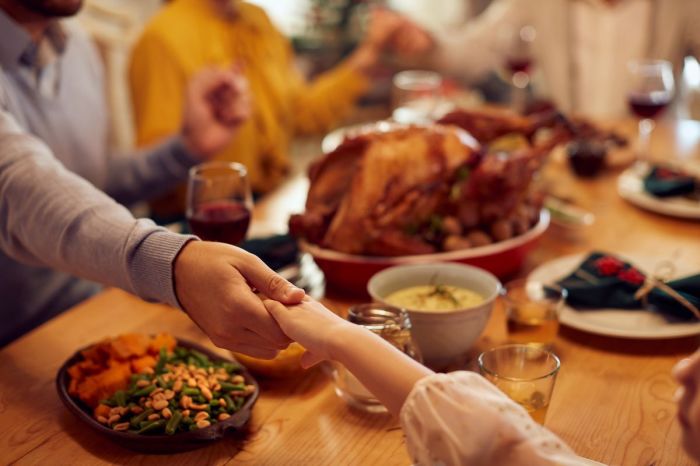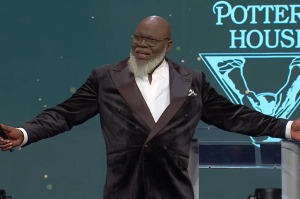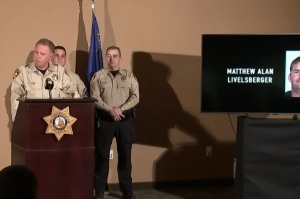How should Christians celebrate Thanksgiving with non-believing family, friends?

This Thursday, Americans will observe Thanksgiving, a holiday known for bringing families together to feast and give thanks for the blessings in their lives.
Thanksgiving has become a time of tension for many families as kinfolk of different political and religious affiliations find themselves together for hours on end.
While some people might opt to skip family gatherings rather than be around relatives who share different beliefs and points of view, others could be faced with awkward conversations around hot-button issues or current events.
As the population of the United States becomes more religiously diverse, many Christians will be celebrating the holiday alongside people of other faiths or no faith at all. How should they deal with such situations?
The Christian Post reached out to prominent Christian organizations for tips on how believers should celebrate Thanksgiving when gathered with non-believers or family members of different persuasions. Below is their advice.
The golden rule
National Association of Evangelicals President Walter Kim, the pastor of Trinity Presbyterian Church in Charlottesville, Virginia, said that in his “personal and pastoral experience,” “it is inevitable that such diversity of faith perspectives would appear around the table.”
Kim advised believers to “take some time to pray” as part of their preparations for the gathering. He suggested Christians should pray that “God would be honored in the interactions and that a spirit of gratitude would, in fact, be central to the time.”
“When we host others, we hope for them to be respectful of our traditions, not as an imposition upon our guests, but as an invitation to our family life,” Kim said.
“If it is your tradition to pray before the meal in Jesus’ name or to go around the table and share one thing for which you are grateful, then please do so. However, take some time to explain what you’re doing and to relieve your guests of any anxieties. Let them know about your tradition to pray before the meal, but that you are not asking them to pray out loud.”
Kim told CP that the “golden rule” laid out in Luke 6:31 — “Do to others as you would have them do to you” — is a “good guide” when approaching interfaith Thanksgiving meals.
“We ought to offer the same measure of respect in the traditions of others that we would hope for ours,” he added. “When you ask questions or show interest in the celebrations of your non-Christian host, it can often lead to tactful opportunities to share about ways in which giving thanks is so vital to you as a Christian.”
‘Not really a table for debate’
Geremy Keeton, the senior director of Focus on the Family’s Counseling Services Department, told CP that there is nothing new about people of different faiths coming together for Thanksgiving.
“Lest we be discouraged by any of this, keep in mind that an ‘interfaith’ gathering is basically at the root of Thanksgiving,” Keeton said, referencing the 1620 meal in colonial Massachusetts generally considered the “First Thanksgiving.”
“Weren’t the English Puritan Pilgrims and Native Americans the originators of the first ‘American interfaith’ Thanksgiving meal? You might say that sharing ‘bounty’ and pausing to be grateful for it has brought together diversity of culture and faith for quite some time, hasn’t it?”
For Christian families hosting non-Christian guests, Keeton emphasized the importance of being hospitable and not forceful about beliefs.
“Welcome people. Be curious and open about their lives. Share who you are and what makes you grateful while inviting them to do the same,” he explained.
“Listen and gently respond. Don’t force an agenda. Just live out the light of Christ that has changed you for the better. The table of gratefulness is not really a table for debate.”
When Christians attend gatherings hosted by non-Christians on Thanksgiving, Keeton advised being “a good guest” and taking “cues from your host.”
“Be open to their lead while remaining in your own sense of integrity and a grateful connection to your Lord and faith. A thankful spirit, even for the smallest of things a host provides, is a lovely outgrowth of your walk with Him,” the Focus on the Family director said.
“Focusing prayerfully and intently on the fruit of the Spirit prior to a gathering over which you’re feeling nervous might be a really useful and calming idea.”
‘Kindness if a powerful witness’
When asked how a Christian witness can bring peace to a diverse Thanksgiving gathering, Kim cited Galatians 5:22-23, which speaks of the “fruit of the Spirit.”
“When we look at the fruit of the Spirit,” explained Kim, “we see characteristics of love, peace, kindness and gentleness, and we don’t read about a Spirit-filled virtue of winning arguments or making points.”
“Kindness is a powerful witness, and gratitude can deeply convey the Gospel’s power to change lives.”
Keeton said that “human hospitality is a deeply Christian ethic” and “Thanksgiving has a history of prompting a pause from rough and tumble chaos and inviting order to our souls.”
“Even amid the throes of U.S. Civil War, Abraham Lincoln issued a national proclamation of Thanksgiving,” Keeton stressed. “An attitude of genuine thanksgiving puts us not in a state of mind for rancor, but in a posture of humility and even dependency.”
“This wise humility and dependency on our Heavenly Provider is what Jesus modeled in His every Gospel interaction,” Keeton continued. “True and biblical gratefulness grounds and calms us despite our conflicts, woes and worries. A truly calm soul in a world of chaos is a balm to self and others. I think Jesus lived this, and with each passing year, I am trying to live it more too.”





























